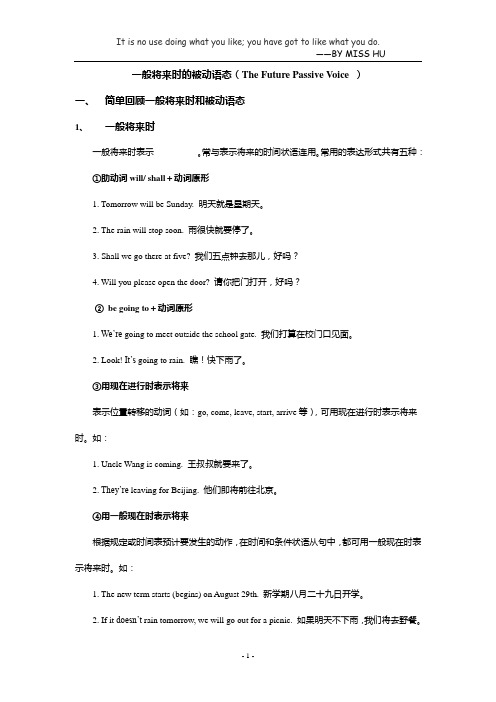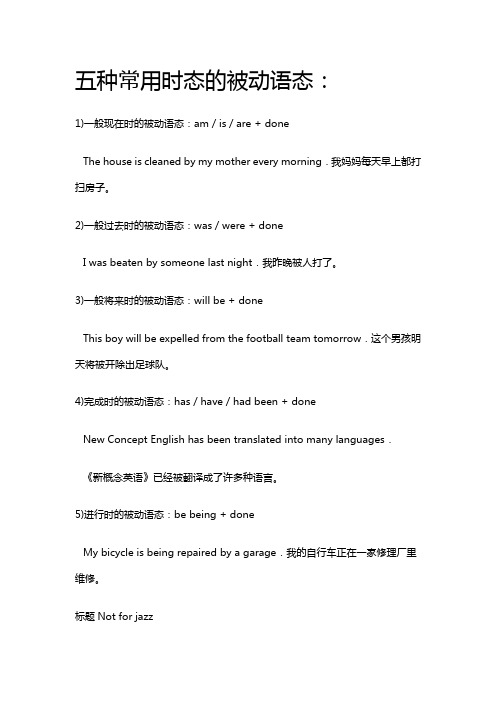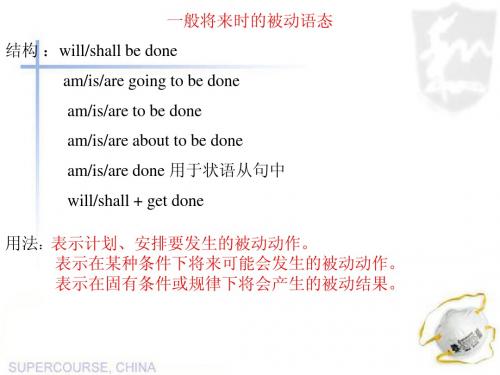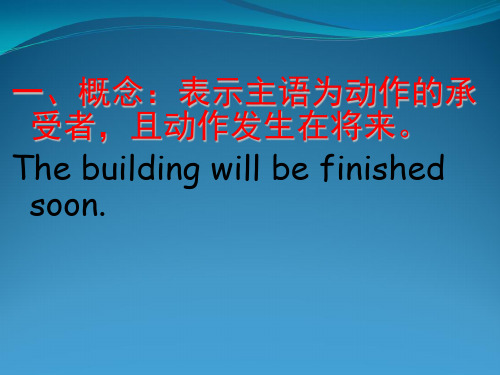一般将来时被动语态
(完整版)一般将来时的被动语态

一般将来时的被动语态(The Future Passive Voice )一、简单回顾一般将来时和被动语态1、一般将来时一般将来时表示__________。
常与表示将来的时间状语连用。
常用的表达形式共有五种:①助动词will/ shall+动词原形1. Tomorrow will be Sunday. 明天就是星期天。
2. The rain will stop soon. 雨很快就要停了。
3. Shall we go there at five? 我们五点钟去那儿,好吗?4. Will you please open the door? 请你把门打开,好吗?②be going to+动词原形1. We’re going to meet outside the school gate. 我们打算在校门口见面。
2. Look! It’s going to rain. 瞧!快下雨了。
③用现在进行时表示将来表示位置转移的动词(如:go, come, leave, start, arrive等),可用现在进行时表示将来时。
如:1. Uncle Wang is coming. 王叔叔就要来了。
2. They’re leaving for Beijing. 他们即将前往北京。
④用一般现在时表示将来根据规定或时间表预计要发生的动作,在时间和条件状语从句中,都可用一般现在时表示将来时。
如:1. The new term starts (begins) on August 29th. 新学期八月二十九日开学。
2. If it doesn’t rain tomorrow, we will go out for a picnic. 如果明天不下雨,我们将去野餐。
⑤“be+动词不定式”或“be about to +动词原形”1. He is to visit Japan next year. 明年他将访问日本。
2. They’re about to leave. 他们就要走了。
一般将来时的被动语态例句

一般将来时的被动语态例句一般将来时的被动语态例句:一般将来时的被动语态构成:will+ be + 及物动词的过去分词:A new hospital will be built in our city.Many more trees will be planted next year.The classroom will be cleaned by Lilei tomorrow.These homework will be finished in ten minutes.The building will be built in the end of this year.I think he will be beat in the end.Thousands of trees be planted on the hill next year.They will be asked to attend the meeting.In class you will not be allowed to leave .This letter will not be posted tomorrow.These cups be broken by he yesterday.A horse will not be drawn in a second.I think i will be killed by you.This song will be sung tomorrow .The tenth lesson will be learnt in next week .Lunch is going to be finished cooking when i come backHe will be sent to America to study when you come back .问:一般将来时的被动语态可用于哪些场合?答:如果一个动作在将来某个时间发生或持续,且句子的主语又是该动作的承受者,那就要用一般将来时的被动语态.一般将来时中常有tomorrow,next year,in two hours,after three o’clock等时间状语.如:This building will be finished next year.这幢楼将于明年完工.A new factory is going to be built in our city.一个新工厂将在我市建成.My homework is to be finished in ten minutes.我的家庭作业将在10分钟内完成.问:一般将来时的被动语态有哪些主要表达形式?答:主要表达形式有四种:a.will/shall+ be done 如:The new film will be shown next Thursday.这部新电影将在下周四上映.b.be going to +be done (表示即将发生的被动行为)如:The sports meeting is going to be held on April 10.运动会将于四月十日举行.c.be to +be done (表示按计划进行或征求对方意见)如:The problem is to be discussed at the meeting tomorrow.这个问题将在明天的会上讨论.d.be about to be done (表示某事即将发生,后不接时间状语)如:An answer is about to be given to you.马上给你答复.3.问:一般现在时被动语态能否代替一般将来时被动语态?答:能.但这种替代是有条件的.在时间、条件状语从句中,也用一般现在时的被动语态代替一般将来时的被动语态.如:If I am given enough time,I will go to Japan for my holiday.如果我有足够的时间,我要去日本度假.。
五种常用时态的被动语态

五种常用时态的被动语态:1)一般现在时的被动语态:am/is/are + doneThe house is cleaned by my mother every morning.我妈妈每天早上都打扫房子。
2)一般过去时的被动语态:was/were + doneI was beaten by someone last night.我昨晚被人打了。
3)一般将来时的被动语态:will be + doneThis boy will be expelled from the football team tomorrow.这个男孩明天将被开除出足球队。
4)完成时的被动语态:has/have/had been + doneNew Concept English has been translated into many languages.《新概念英语》已经被翻译成了许多种语言。
5)进行时的被动语态:be being + doneMy bicycle is being repaired by a garage.我的自行车正在一家修理厂里维修。
标题Not for jazz总结for的用法:1)为:I bought a book for you.我为你买了一本书。
2)因为:Something fell in,for I heard a splash.一定有东西掉下去了,因为我听见扑通一声。
4)适合:Not for jazz=It's not suitable to play jazz on the clavichord.古钢琴不适合演奏爵士乐。
Question:What happened to the clavichord?to后面加宾语,表示其身上发生了什么事,即动作的目标、对象。
What happened to you?你怎么了?(在你身上发生了什么事?)(1)否定句与疑问句的被动语态We don’t believe her.我们不信她的话。
一般将来时的被动语态

习题演练 A 1. Don’t worry ; all the flowers in the garden ________good care of when you are away. A. will be taken B. have taken C. have been taken D. will take B 2. The volleyball match _______ if it rains tomorrow. A. Will put off B. will be put off C. is put off D. puts off 3. ------Do you have any problems if you _____ C this job? ------Well, I’m thinking about the salary. A. offer B. will offer C. are offered D. will be offered D 4. In the near future, more advances in the robot technology _____ by science. A. are making B. are made C. will make D. will be made A 5. The weather will continue when a cold front ______ to arrive. A. is expected B. is expecting C. was expected D. withe weather is so bad, the sports meeting _________. A. is to put off B. is put off C. is to be put off D. will put off
一般将来时的被动语态

注意的几个问题
1.在时间,条件状语从句中,应使用现在时表将来,同样,应使用现在时的被 动语态表示将来时的被动语态。 eg:He says he will leave the company if he is punished for this. 短语动词便被动语态时不能漏掉介词和副词。 那个老年人将会照顾好这个小女孩。 —————————————————— The little girl will be taken care of by the old man.
一般将来时的被动语态
否定式: won`t/shan`t be 动词id过去分词
疑问式:
will/shall 主语 be 过去分词 特殊疑问句: 特殊疑问词 shall/will 主语 be 过去分词 其他 1.他将不会受到惩罚 eg:He will not be punished for it. 下个月这所房子将重刷吗? eg: Will the house be painted again next month? 将在哪里建电影院? eg: Where will the cinema be built.
一般将来时的被动语态
一般将来时的几种表达法
主动形式
1. will/shall do
被动结构
will/shall be done
2 .be
3.be
to do
be to be done
be going to be done be about to be done
going to do
4. be about to do
A.把下列句子改成被动结构
1.Sue is going to write the report. The report is going to be written by Sue. ____________________________________________.
book2 unit 2一般将来时的被动语态

Book2 Unit 2 The Olympic Games一般将来时的被动语态一.定义一般将来时的被动语态表示在将来某一时间或时间段内将要发生的被动动作,常与表示将来的时间状语,如tomorrow, next week, in a few years等连用。
二.构成1.基本构成(以动词do为例)(1)肯定形式:will/shall +be done(2)否定形式:will/shall not +be done(3)疑问形式:will/shall +主语+be done2.其他形式①am/is/are to be done【1】表示按计划或安排将要发生的被动动作【3】表示“必须”,意思相当于must 或have to .Eg. His new book is to be published next week.What is to be done next ?The task is to be finished before Friday.②am/is /are going to be done常用来表示按计划或安排将要发生的被动动作This problem is going to be discussed in today's class meeting will/shall get done 表示将来被动动作的结果典例(2012.辽宁高考)Mum, I was wondering if you could lendme a few dollars until I on Friday.A.get paidB.got paidC. have paidD. had been paid注意:在时间,条件或让步状语从句中,常用一般现在时的被动语态代替一般将来时的被动语态。
典例(2014.大纲版全国卷)Unless some extra money , the theatre will close.A.was foundB. FindsC. is foundD. FoundPractice:1.If everything goes according to the plan, the first stage by September.A.would completeB.will completeC. Would be completedD. will be completed2.--Are you going to plant a great many trees in this area?---- Yes. The soil away in this way.A.doesn't washB. won't washC. isn't washedD. won't be washed3.The old temple in my hometown next month.A.is going to be rebuiltB. will rebuildC. is going to rebuildD. shall not rebuild4.The volleyball match if it rains tomorrow.A.will put offB.will be put offC. is put offD. puts off5.I promise that the time to study hard.A.will make good use ofB. will make good useC. will be made good use ofD. will be made good use6.Now that the weather is so bad , the sports meet .A.is to put offB. is put offC.is to be put offD. will put off7.---Do you have any problems if you this job?----Well, I'm thinking about the salary.A. offerB. will offerC.are offeredD. will be offered。
高中一般将来时的被动语态

3、主句谓语动词带有复合宾语? The doctor will make him give
up smoking.
4.以下句子正确吗?
If I am given enougБайду номын сангаас time, I will go to Japan for my holiday.
The new film will shown next thursday.
Computers____in everyday life in this country before long.
A.are used B.will use C.will be used
I promise that this matter___next week.
A.will be taken care B.will be taken care of
A.are made B.are make C.will be made
三、一般将来时其他常见的被动语 态形式
1.be to be done 表示按计划、安排将要发生的被动
动作
The work will be done by Tom.
特殊用法: What is to be done next? The work is to be finished
词的过去分词
If you don't obey the rules; you will be punished.
Shall I be admitted into the stadium?
In the near future, more advances in the robot technology___by scientists.
一般将来时的被动语态

一般将来时的被动语态主备人:潘素敏刘猛【例句展示】1. What will be done next? 接下来要做什么?2. The government is going to build a new school next year and it is going to be built in the poor village. 明年政府将建一所新的学校。
这所学校将被建在这个贫穷的村子里。
3. No books are to be taken out of the readingroom. 书不允许带出阅览室。
4. We can ensure that the work shall be done on time. 我们能保证按时完成工作。
【归纳总结】1. 一般将来时被动语态构成:一般将来时的被动语态构成为:will / shall + (如句1、句4); am / is / are going to + (如句2);am / is / are to +(如句3)。
2. 一般将来时的被动语态用法。
(1)表示根据计划或安排发生的被动性动作。
如:This work will / is going to / is to be done at once. 这项工作将立即被完成。
(2)表示有固定性条件就有规律性被动结果,此时常用。
如:If you park your car here, you will be fined. 如果你将车停在这儿,你将被罚款。
(3)表示到将来某一时刻为止已经完成的被动性动作,此时常用时的被动语态代替一般将来时被动语态。
如:I’ll come to see you when m y homework has been finished. 等我的家庭作业做完,我会去拜访你。
(4)用于时间状语从句或条件状语从句中,此时应用时的被动语态形式代替一般将来时被动语态。
如:I need one more stamp before my collection is completed. 再有一张邮票我的收藏就完整了。
一般将来时的被动语态

3
b件事。
一般将来时的被动语态的例句
医生会在下周给你打电话。 这本书将会被翻译成多种语言。
The doctor will call you next week.
This book will be translated into many languages.
一般将来时的被动语态的否定句
1 构成
will + not + be + 过去分词
否定句
will + not + be + 过去分词
疑问句
Will + 主语 + be + 过去分词?
一般将来时的被动语态的用法
强调动作
将被强调的动作置于句首。
存在将来时的上下文
如果情境中需要表示将来时的 动作被动发生,可以使用一般 将来时的被动语态。
解释规则要求
某些语言的规则要求使用被动 语态来表达将来的事件。
2 例子
这个计划不会被取消。 这个工作不会被完成。
一般将来时的被动语态的疑问句
1 构成
Will + 主语 + be + 过去分词?
2 例子
你明天会被请出席会议吗? 将会有人参加聚会。
一般将来时的被动语态的特殊句型
1
by + 时间
到某个具体的时间,指定特定的事件必须完成。
2
within + 时间
表示将在一定时间范围内完成某件事。
一般将来时的被动语态
在本次演示中,我们将介绍一般将来时的被动语态的定义、构成、用法、例 句、否定句、疑问句和特殊句型。
什么是一般将来时的被动语态?
定义
表示将来某个时间会被动地发生的动作或状态。
一般将来时的被动语态

一般将来时的被动语态【概念】(1)一般将来时的被动语态:表示将要发生的被动动作.(2)被动语态:被动语态:(passive voice)是动词的一种形式,用以说明主语与谓语动词之间的关系.英语的语态共有两种:主动语态和被动语态.主动语态表示主语是动作的执行者,被动语态表示主语是动作的承受者.被动语态是动词的一种特殊形式,一般来说,只有需要动作对象的及物动词才有被动语态.汉语往往用"被"、"受"、"给"等被动词来表示被动意义.被动语态由"助动词be+及物动词的过去分词"构成.(3)及物动词:在英语中按动词后可否直接跟宾语,可以把动词分成两种:及物动词与不及物动词.字典里词后标有vt.的就是及物动词,字典里词后标有vi.的就是不及物动词.不及物动词后不能直接跟有动作的对象(即宾语),若要跟宾语,必须先在其后添加上某个介词,如to,of,at后方可跟上宾语.及物动词可直接跟宾语.【结构】一般将来时的被动语态结构形式:主语+be going to/will/shall(第一人称)+be+及物动词的过去分词.例:The problem will be discussed one by one at the meeting.会议上我们将会一个一个的讨论这些问题.①主语+be going to/will/shall(第一人称)+be+(by+宾语),其中by意为"被…;由…",表动作的执行者.例:The results of the survey will be published in the newspapers.调查的结果将会在报纸上被公布.②其肯定式、否定式、疑问式的变化规则.如:The results of the survey will be published in the newspapers.(肯定式)The results of the survey will not be published in the newspapers.(否定式)Will the results of the survey be published in the newspapers?(疑问式)Yes,they will./No,they won't.。
高一一般将来时被动语态

一般将来时的被动语态概念:一般将来时表示将来某个时间要发生的动作或存在的状态,也表示将来经常发生的动作。
二、一般将来时结构:1.主语+ will (shall) + 动词原形~。
动词一般将来时,表示将要发生事(所有人称都可以用will,shall只用于I, We 后面)如:肯定式:They will finish the work next week.否定式:They won’t finish the work next week.疑问式:Will they finish the work next week?2. 主语+ be (am, is, are) going to + 动词原形~。
be going to, 表打算,准备计划将来干;表可能,有必然,通过现象来判断。
如:I’m going to see a film this evening. 今晚上我打算去看电影。
It’s going to rain. 天要下雨了。
We aren’t going to have any lessons next week.我们下周不上课。
注意: will/ shall 和be going to 结构的区别(1)对于事先经过考虑的打算、计划,应使用be going to 结构。
Why are you taking down all the pictures? I am going to repaint the wall.(2)对于事先未经过考虑的打算、计划,而是临时起意,则用will 结构。
常见于会话时,乙听了甲的话做出的反应。
Where is the telephone book? I’ll go and get it for you .(3)表示即将发生某事时,两者区别不大,多可互换。
What is going to happen? -----What will happen?be going to 一般指较近的将来,will则表示较远的将来。
原创2:一般将来时的被动语态

Canonical analysis
1. Hundreds of jobs _w_i_ll__b_e_l_o_st_ if the factory closes.
A. lose
B. will be lost
C. are lost
D. will lose
Canonical analysis
2.The water will be further polluted unless some measures _a_r_e_t_a_k_e_n_.
Our next wall newspaper will be designed by Chi Jiamin and Xia Minghui.
Presentation
Ⅰ. 一般将来时被动语态的构成 表达形式2:be going to + be + vt过去分词
表示“……将要被……”
Some old buildings are going to be put down.一些老建筑将被推到。
will/shall be done; 一般将来时的被动语态结构: am/are/ is going to be done
“人/物将会被……”
结构归纳
Presentation
Ⅰ. 一般将来时被动语态的构成 表达形式1:will / shall + be + vt过去分词
表示“……将要被……”
The next Olympic Games will be held in Rio, 2016.
更多精彩内容请登录:
Presentation
一般疑问句: (Will/Shall) +主语 +be + V过去分词
一般将来时的被动语态

to
4.We are to put off the meeting till Friday.
The meeting is to be put till Friday. off n5e.eIdn+eeddotiongre=panieretdhteohboeudseo.ne.
The house needs repairing.
2. They will put another three subways into use in this city. Another three subways _w_i_ll_b_e__p_u_t_i_n_to__u_se in this city.
3. We are to put off the sports meeting because of the bad weather. The sports meeting __is__to__b_e_p_u_t__o_ff___ because of the bad weather. 4. They will not allow you to take so
A new bridge was built last year.
4.He can carry the basket easily.
The basket can be easily carried .
presentation
1. The 2008 Olympic Games will be held in Beijing, China.
Grammar
The Future Passive Voice
一般将来时的被动语态
Revision
被动语态结构:be动词+及物动词的过去分词
九年级上册Module 9 一般将来时的被动语态

Module 9 Great Inventions (伟大的发明)一般将来时的被动语态:结构:be going to /will/ shall/ +be +动词的过去分词肯定句:主语+will be +done +by 或主语+am / is / are going to be done +byA highway will be constructed in our city. 明年我们市将要修建一条公路。
The problem is going to be discussed at tomorrow’s meeting. 这个问题要在明天的会议上讨论。
否定句:主语+will not be +done 主语+am / is / are not going to be +doneHe won’t be invited to this party. 他将不会被邀请参加这次聚会。
The old library isn’t going to be pulled down next month. 那座旧图书馆下个月不会被拆除。
一般疑问句:will +主语+be done Will they be allowed to go ?他们会被允许去吗?Am / is / are +主语+going to be +doneIs his new book going to be published next week? 他的新书下个月就要出版了吗?特殊疑问句:特殊疑问词+will +主语+be +done When will the work be finished ?这项工作什么时候能完成?特殊疑问词+ be +主语+going to be +doneWhere is the football match going to be held next week? 下周足球比赛要在哪儿举行?What is going to be held next week in our school? 下周我们学校要举办什么活动? 表示将来意义的被动结构还有等。
一般将来时的被动语态

一般将来时的被动语态1. 什么是一般将来时的被动语态一般将来时的被动语态是指在将来发生的动作或状态下,主语承受动作或承受状态。
被动语态的结构为:will be + 过去分词。
2. 一般将来时的被动语态的构成一般将来时的被动语态的构成如下:- 肯定句:主语 + will be + 过去分词- 否定句:主语 + will not be + 过去分词- 疑问句:Will + 主语 + be + 过去分词 + ?3. 一般将来时的被动语态的使用情况一般将来时的被动语态通常用于以下情况:- 描述将来的预测、计划或安排- The meeting will be held next week. (会议将于下周举行。
)- The house will be renovated next month. (房子将在下个月进行翻修。
)- 描述某人对将来事件的预测或判断- The movie will be loved by audiences. (这部电影将会受到观众的喜爱。
)- The new product will be well received in the market. (这个新产品将在市场上受到好评。
)- 描述按计划或安排将要发生的动作或事件- The report will be submitted before the deadline. (报告将会在截止日期之前提交。
)- The package will be delivered to your address tomorrow. (包裹将于明天送到您的地址。
)4. 小结一般将来时的被动语态是在将来发生的动作或状态下,主语承受动作或承受状态的语态形式。
它的构成为:will be + 过去分词。
一般将来时的被动语态通常用于描述将来的预测、计划或安排,某人对将来事件的预测或判断,以及按计划或安排将要发生的动作或事件。
一般将来时被动语态的基本结构

一般将来时被动语态的基本结构
1. 一般将来时被动语态的基本结构就是“will be + 过去分词”呀!就像“这棵树明天将会被砍倒”。
2. 你想想看,“will be + 过去分词”,多简单直接呀!比如说“那座房子将来会被重建”。
3. 不就是“will be + 过去分词”嘛,很好理解的啦!像“这个计划下个月会被实施”。
4. 哎呀,一般将来时被动语态基本结构就是这样啦,“will be + 过去分词”,就好比“那辆车很快会被修好”。
5. 一般将来时被动语态,不就是“will be + 过去分词”嘛,多明显呀!比如“这个问题将来会被解决”。
6. 嘿,就是“will be + 过去分词”呀,很容易记住的哟!像“这些花明天会被浇水”。
7. 一般将来时被动语态的基本结构不就是“will be + 过去分词”嘛,就跟“那个包裹很快会被送达”一样。
8. 你看呀,“will be + 过去分词”,不难理解吧!例如“这件衣服将来会被洗干净”。
9. 这不就是“will be + 过去分词”嘛,简单得很呢!像“那片区域以后会被开发”。
10. 一般将来时被动语态的基本结构呀,就是“will be + 过去分词”,就好像“这些水果明天会被吃掉”。
我的观点结论:一般将来时被动语态的基本结构就是“will be + 过去分词”,掌握了这个,很多表达就容易多啦!。
- 1、下载文档前请自行甄别文档内容的完整性,平台不提供额外的编辑、内容补充、找答案等附加服务。
- 2、"仅部分预览"的文档,不可在线预览部分如存在完整性等问题,可反馈申请退款(可完整预览的文档不适用该条件!)。
- 3、如文档侵犯您的权益,请联系客服反馈,我们会尽快为您处理(人工客服工作时间:9:00-18:30)。
被动语态否定:主语+will/shall +not+ be+过去分词
被动语态疑问:will/shall +主语+be+过去分词?
(The Passive Voice)
动词过去分词的构成规则(与动词过去式构成规则一样) 1、一般在动词原形末尾加-ed,looked played 2、结尾是e的动词加-d , lived used 3、末尾只有一个辅音字母的重读闭音节词,先双写 这个辅音字母,再加-ed, planned tripped
一般将来时:主语+will + be+过去分词 The new school ______ when the new term begins. A. finishes B. will finish C. will be finished D. would finish
Can you try?
1.These films ___C___ until tomorrow morning.
3. I ____A__ if I finish the work.
A.shall be praised B. would praise
C. will praise D. praise 4. If it doesn’t rain tomorrow, the sports
meet ___C___ in the playground of our school.
4、结尾是“辅音字母+y”的动词,先变“y”为 “i” , 再加-ed , study---studied, carry--carried
不规则的过去分词要牢记
sing----sang----sung
build----built----built 写出下列动词的过去式,过去分词:
1、speak (
一般将来时:表示将来发生的动作或存在的状态, 最基本的结构:will/shall + 动词原形 (shall用于 第一人称)
肯定句:主语+ will +动词原形+(宾语)+其他
Some day people will go to the moon .
否定句:在will 的后面加not即可。will not 可缩 写为 won’t
A.is holding B. will hold
C. will be held D. is to be holding
)
2、use (
)
3、make (
)
4、write (
)
5、grow (
)
6、plant (
)
7、pr(
)
10、send (
)
11 、 build (
)
12、invite (
)
请写出下列动词的过去式和过去分词: 1、speak spoke spoken 2、use used used 3、make made made 4、write wrote written 5、grow grew grown 6、plant planted planted 7.produce produced produced 8、ask asked asked 9、plan planned planned 10、send sent sent 11 、 build built built 12、invite invited invited
主语+ will +not+动词原形+(宾语)+其他
一般疑问句:把will 提到句子主语之前,结尾变 问号。
被动语态(The Passive Voice): 主动语态表示主语是动作的执行者; 被动语态表示主语是动作的承受者。 结构为:be(am,is,are,was,were )+done 一般将来时:主语+will/shall+动原
A. can't develop B. aren't developing
C. won't be developed D. won't develop
2. Hundreds of jobs ___B___ if the factory closes.
A.lose B. will be lost
C. are lost D. will lose
